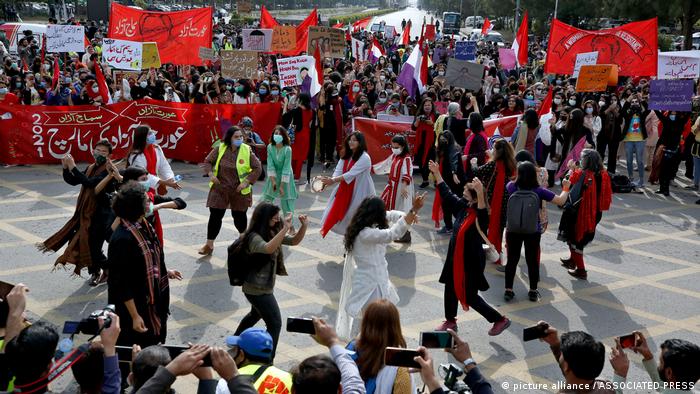

Published on 6 April 2021 in Action alerts Blasphemy news
Pakistan: false ‘blasphemy’ allegations used to harass women’s rights activists
The malicious spreading of ‘blasphemy’ accusations against women’s rights activists involved in peaceful protests across Pakistan demonstrates how such legislation is used to persecute minorities and dissenting voices in the country, said the End Blasphemy Laws coalition today.
On 8 March, to mark International Women’s Day, thousands of women across Pakistan attended a series of coordinated Aurat Marches (“aurat” translates to “woman” in Urdu) aiming to draw attention to the challenges Pakistani women face in their daily lives, this year under the slogan “my body, my control”.
Organizers of the marches were immediately met with a malicious disinformation campaign designed to discredit them and paint them as immoral, which included doctored images and video clips. Those sharing the content included journalists and political figures with social media followings reported to be in the millions.
Marchers were accused of displaying banners and chanting slogans with ‘blasphemous’ content. They were also accused of “subscribing to a foreign agenda” after the red, white and purple flag of the Women Democratic Front of Pakistan (WDF) – a feminist organization based in Islamabad – was falsely identified as the French flag.
On 12 March, the Pakistani Taliban threatened the organizers of the march with vigilante justice writing that writing that the organizers needed to “[f]ix your ways, there are still many young Muslims here who know how to protect Islam and the boundaries set by Allah.”
Religious groups held demonstrations in several cities to demand that the government prosecute the march organisers for blasphemy, and they threatened vigilante action.
According to Deutsche Welle, “at least two local courts — one in the northwestern city of Peshawar and another in the southern port city of Karachi — have asked police to register cases against organizers of the march, alleging violations of blasphemy and other laws. A petition seeking to ban the annual gathering has also been lodged with the Islamabad High Court.”
Over 300 people have signed an open letter calling on the Prime Minister Imran Khan to guarantee the safety of the march’s participants and organizers, as the doctored images continue to circulate.
Amid wider sectarian and interreligious tension, Pakistan’s harsh blasphemy laws are a serious threat to peace and social stability. “Blasphemy” is punishable by death under law, and accusations often followed by mob brutality with fatal consequences.
Though there has been an effective moratorium on carrying out the death sentence in recent years, dozens of people at least remain on death row, and furthermore those accused of blasphemy are often murdered before or after any trial takes place. Frequent targets of such legislation include the non-religious, religious minorities and dissenting Muslims.
Blasphemy laws carry the death penalty or life in prison, and tend to target non-believers, religious minorities and dissenting Muslims. In March 2021, the Digital Rights Foundation published a briefing paper on the representation of vulnerable groups in the media, which details the silencing effect that the fear of accusations of blasphemy provokes in minorities in Pakistan.
The EBL Coalition stands firmly in solidarity with the organizers and participants of the Aurat marches and calls on the Pakistani authorities to safeguard their wellbeing.